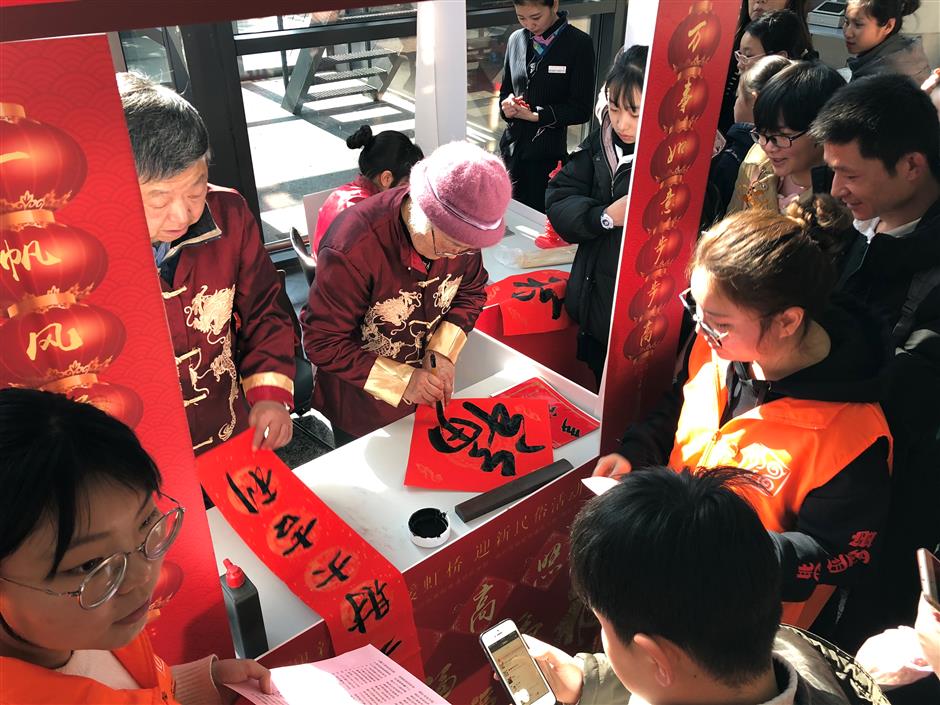Holiday sentiments put to poetry
Minhang District revved up the spirit of Spring Festival with its second annual Lunar New Year couplets contest and related holiday activities in Xinzhuang, Zhuanqiao, Pujiang and Hongqiao towns.
Zhuanqiao Wanda Plaza was the biggest venue for the event. It provided a performance of folk songs in the Shanghai dialect as some calligraphers and students wrote 200 pairs of couplets while a crowd looked on. Many of the onlookers joined in the writing.
According to ancient tradition, Spring Festival couplets are written vertically in black or golden colors on red paper and composed of a pair of poetry lines. The scrolls are affixed on either side of the front door. The couplets express joy over the Lunar New Year and wishes for a better life in the coming year. Couplets originated from inscriptions on boards made from peach trees in the Zhou Dynasty (1046-256 BC).
According to legend, in the ghost world, a rooster perching in a big peach tree will crow at dawn to call all the traveling ghosts back. People believed that peach wood scared off evil beings, so the boards were hung on front doors. In the Song Dynasty (960- 1279), the wood board was replaced by paper, and the focus turned from evil spirits to bright wishes for the future.
The custom became popular in the Ming Dynasty (1368-1644). Emperor Zhu Yuanzhang, who saw the pairs of scrolls during his travels, found them charming and ordered all households in the realm to affix the scrolls to their doors during the Lunar New Year.
Some of the couplets written in Minhang were given as gifts to model workers and “national beautiful families.” Volunteers fanned out to distribute 1,000 good-luck messages to passengers in the Zhuanqiao and Beiqiao Metro stations.
In the Zhuanqiao Neighborhood Center, calligraphy lovers presented their couplets to elderly people living alone.
Eight calligraphers from the Shanghai Wu Changshuo Arts Research Association gathered in the Hongqiao Railway Station, writing improvised couplets for travelers.
“The rai lway station is supposed to be a place for goodbyes, and this activity creates festival vibes,” said Cui Songge, a passenger. “All Chinese share Holiday sentiments put to poetry a similar mood on Spring Festival. Whether you’re an adult or child, receiving a pair of couplets can always put on smile on your face.”
Other activities at the railway station included dough modeling based on the requests of travelers and playing the guzheng, an ancient plucked Chinese instrument. Volunteers even prepared “selfie” frames decorated in red for travelers who wanted to photograph themselves.
The event at the station lasted for three hours, making the railway station even more crowded during China’s busiest travel season.
“We wanted to provide a better traveling experience for people heading back to hometown,” said Xu Huiling, Party secretary of the Hongqiao Railway Station.
This is the second year for the Meibo Art Review Center to sponsor this holiday event. Folk artisans were also on hand to demonstrate the traditional art of paper-cuts.
The event collected 2,600 pairs of couplets from 29 provinces of China. Participants included farmers, workers, poets and overseas Chinese. Some 65 of the couplets won prizes.
“Many people complain that the atmosphere of Spring Festival in Shanghai is getting thinner, so I think this event comes at just the right time."

















